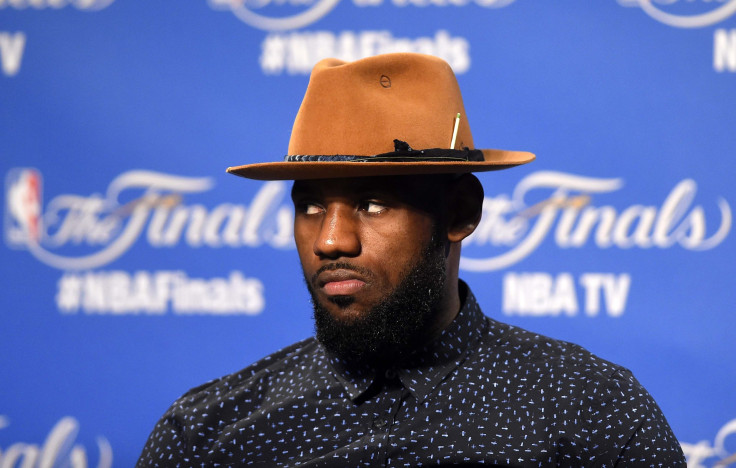NBA Finals 2015 MVP: LeBron James' Dominant Statistical Performance Couldn't Overcome Cavaliers Loss, History

Cleveland’s Quicken Loans Arena erupted in boos late Tuesday night when Commissioner Adam Silver announced that Andre Iguodala, not LeBron James, had won the 2015 NBA Finals MVP award. For the hometown crowd, the fact that Iguodala’s Golden State Warriors handily defeated the Cavaliers did not diminish James’ gargantuan effort to keep Cleveland’s injury-riddled roster afloat.
During the six NBA Finals games, James held Cleveland’s middling offense together. He became the first player to lead both teams in points, assists and rebounds per game during a championship series. But historical precedent and questions about James’ offensive efficiency hampered his bid to become one of the few athletes in American sports to win championship MVP honors in a losing effort.
“It would have been totally justifiable on the [statistical] merits for LeBron to win the MVP. However, because this is a culture that prioritizes winning above all else, that didn’t happen,” said Daniel Nathan, an American studies professor and sports historian at Skidmore College in Saratoga Springs, New York.
That the Cavaliers even made it to Game 6 was a testament to James’ dominant statistical output. Many pundits wrote off Cleveland’s NBA title hopes after star point guard Kyrie Irving, James’ most talented teammate, fractured his kneecap in Game 1. Devoid of both Irving and power forward Kevin Love, who suffered a season-ending shoulder injury earlier in the playoffs, James was left with a depleted supporting cast that featured wildly inconsistent performances from J.R. Smith, Iman Shumpert and Matthew Dellavedova. The three guards did not score a single point during the series when James wasn’t on the floor, ESPN’s Tom Haberstroh noted.
Yet somehow, the Cavaliers managed to push reigning regular season MVP Stephen Curry, Klay Thompson, Iguodala and the rest of Golden State’s incredibly deep roster to six games, with back-to-back wins in Games 2 and 3. James averaged 35.8 points, 8.8 assists and 13.3 rebounds during that stretch and recorded two triple-doubles. He also scored 38.3 percent of the Cavaliers’ points during the series – the second-highest total in NBA Finals history. On several occasions, Cleveland's other players essentially stood and watched James create his own shot or go to work in the post.
“You look around him, it’s LeBron James and four guys he picked up on the street for a pickup game. To get this team into the Finals, to me, is just one of the great professional athletic accomplishments of the last 10 or 20 years,” said Thomas Whalen, associate professor of social sciences and sports historian at Boston University in Massachusetts. “To me, I was astonished that it went six games. I thought it was going to be a sweep.”
The Warriors earned a 3-2 series lead against the Cavaliers after Game 5 last Sunday, even though James recorded the second 40-point triple-double in NBA Finals history. At that point, James' superhuman efforts sparked speculation that he could become the second player in NBA history to win Finals MVP honors despite losing the series. Only Hall of Famer Jerry West, who won the award in 1969 despite his Los Angeles Lakers’ loss in seven games to Bill Russell’s Boston Celtics, has accomplished the feat.
A championship MVP on a losing team is equally rare in America’s other major professional sports. Former New York Yankees player Bobby Richardson, Major League Baseball’s 1960 World Series MVP and former Dallas Cowboys linebacker Chuck Howley, MVP of Super Bowl V in 1971, are the only athletes in their respective sport’s history to earn the honor, the New York Times reported.
James garnered four of 11 possible Finals MVP votes, but the participating media members ultimately gave the award to Iguodala, whose entrance into the Warriors’ starting lineup after Game 2 marked a turning point in the series. Critics argued that Iguodala, who came off the bench for the first two games and averaged just 16.3 points per game during the Finals, was less valuable to the Warriors than James was to the Cavaliers.
But Iguodala played for the winning team, and his strong effort on defense had a noticeable effect on James’ offensive efficiency. James shot just 11-of-46 when Iguodala covered him and made just 39 percent of his shots during the series, well below his regular season average of about 49 percent.
He had one of his worst shooting performances when it mattered most, shooting 13-of-33 during the Warriors’ title-clinching win in Game 6. Curry, who led the Warriors in scoring during the Finals with 26 points per game, attempted 122 total shots during the series. James had 118 misses alone, and 196 shots total. James was forced to shoot more than usual out of necessity due to a lack of offensive support from his teammates, but that didn’t change the fact that he was inefficient.
“It’s really hard to know how many shots LeBron had to take and whether or not that was necessary, because we only have the outcome. But the reality is, in the shots he took, he didn’t shoot particularly well,” said David Berri, a professor of economics at Southern Utah University and prominent basketball statistics analyst. “To give someone an MVP award that shot 39.8 percent on a losing team seems like a bad idea.”
Still, it’s hard to dispute the notion that James would have won MVP honors if the Cavaliers had eked out a championship win. In the results-driven world of American sports, the spoils belong to the victor.
“In this culture, winning is what matters,” Nathan said. “Other forms of excellence just fall by the wayside.”
© Copyright IBTimes 2024. All rights reserved.






















